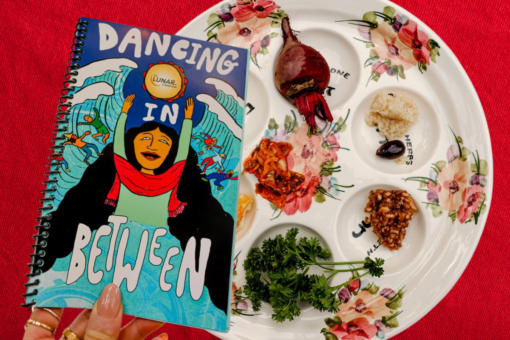I know, I know. You think I have it all.
A spouse. A child. A vague idea of what I want to do with my life.
You’d probably say I have nothing to complain about. And in almost every way, you’d be right. As a white, straight, cis Jewish man, I realize and accept that I occupy a place of immense privilege, especially in a historically patriarchal and heteronormative religion like Judaism. I can make a minyan, get an aliyah, or give a dvar Torah in almost any Jewish community I set foot in, and no one would blink an eye. I don’t experience discrimination or microaggressions in my synagogue or in the workplace. It’s something I think about almost every day, and it’s something that I believe I must bear responsibility for by joining in the fight for the spiritual rights and inclusion of all Jews, regardless of who they are or what they look like.
But us straight, cis, Jewish men have problems, too. And here’s one of the biggest problems we have: We don’t know how to be friends with each other.
Growing up, I was no social butterfly. Actually, I was often called “the quiet kid.” But I had friends. A few friends, the good kind who stood up to bullies for you and camped out in your backyard with you even though they were afraid of bugs.
I made a few more in high school, in my gap-year yeshiva in Israel, and in college at Yeshiva University. I lost some, too. When I got married in my senior year, I expected that they would “back off” for a bit to give me some space. And despite my efforts to the contrary, that’s exactly what they did. And kept doing. It’s not like I never talked to these guys. But time and time again, I had to be the one to reach out, to plan a meetup, to text something more personal than a funny video or interesting article.
A few months ago, when I finally realized how lonely I was from working at home alone all day, I started to reach out again. I knew my friends were working from home, too, and some of them were even home alone like me. I thought I could set up some lunch dates, a weekly Zoom meeting to catch up and talk about life or just shoot the breeze.
Just two of them were interested. Only one of them was able to follow through and actually show up. And then he forgot about it the next week. And the next week. And the next.
At this point, I had to make a decision. I wasn’t going to waste my time reminding these guys about our meetings only to be disappointed again and again when they didn’t show up. So I did something I’ve never done before: I decided to consciously pull back from a friendship.
Then I reached out to some older friends whom I had lost touch with — good guys whom I always really liked but just never really shared overlapping friend circles with. To my pleasant surprise, they were both interested in hanging out weekly. One of them even suggested that we learn some Torah together.
You would think that I would be excited about that. What could be more ego-boosting for an Orthodox Jewish man than having a really smart guy ask you to study a difficult text with him? But alas, I’ve come to be wary of the chavrusa (study partner) move. More often than not, the guys who suggest this to me are the type who aren’t able to open up about their personal lives, and use the learning as a way to fill the time. So as soon as they lose interest in the learning, they lose interest in spending time altogether.
I know what you’re thinking: Why couldn’t I just tell them that? That I was hoping to connect on a more personal level, to talk about things like our families and spirituality? Ay, there’s the rub. I was afraid of appearing not “manly” enough to be worthy of their friendship. I was afraid they wouldn’t want to be friends with me anymore. All because I wanted more from our friendship than studying Talmud and joking around.
Should I have swallowed my fear and said something anyway? Probably. Would my friends have listened if I just told them how I feel? Maybe. But I believe my problem is not unique to me. A lot of men might not even be aware of how much they need a deep, meaningful friendship with another man, instead choosing to bury their loneliness in frequent drinking and locker room talk. And if I, who’s fortunate enough to have a wonderful partner I can talk to every night, feel so lonely all the time, I can’t imagine what it’s like for men who are single.
I get that it’s difficult, even frustrating, to connect with other people virtually right now. It truly is no substitute for being together in person. But a year into this pandemic, so many people are feeling isolated — and becoming used to feeling isolated. Do we really want that to be our reality when this is all over?
When I was in 10th grade, I spent six weeks as an exchange student at an all-boys high school in Israel. It was a life-changing experience — not because of what I learned or the sights I saw as my American classmates and I toured around the country, but because my new Israeli classmates knew how to talk to each other. They knew how to be friends. And as a future school psychologist, I’m learning a lot about the ever-growing field of social-emotional curricula, designed by researchers to teach kids everything from how to manage their own emotions to how to resolve conflict. As I become familiar with the literature, I’ve been struck by how little emphasis is placed on friendship. How can we expect kids to know how to be a good friend — let alone translate that knowledge into the complexities of adult friendship — if we don’t teach them? How can we expect to reduce gender disparities in suicide rate — men are more than three times more likely to die by suicide in the U.S. — if we don’t tell boys that it’s okay to talk about their feelings with other boys?
We can’t. So until I have the skills and experience necessary to make an impact on our schools, I’ll be reaching out to other men, even if they can’t reciprocate the way I need them to. Because even if, for some reason, I have to be lonely, there’s no reason they have to be, too.



